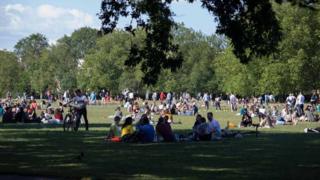
Image copyright
Getty Images
People in the UK must not treat this weekend as a “party” before the new “rule of six” coronavirus restrictions come into force on Monday, a police union has warned.
The Police Federation said there was a “real risk” that the public would “take advantage of the current situation”.
The new rules limit gatherings to six people indoors and outdoors in England.
It comes as one scientist warned the UK was “on the edge of losing control” of the virus.
England’s new rule of six applies to all ages, although there are some exemptions, such as gatherings for work. Those who fail to follow the new rules can be fined by police – £100 for a first offence, doubling on each further offence up to £3,200.
In Scotland, socialising will be limited to a maximum of six people inside and outside – but unlike England they must be from two households, and children under 12 are exempt.
In Wales, also from Monday, it will be illegal for more than six people from an extended household to meet indoors – but up to 30 can still meet outdoors.
In Northern Ireland last month, meanwhile, the number of people who could gather indoors in a private home was reduced from 10 people from four households to six people from two households.
‘Incredibly irresponsible’
With the introduction of the new rules in England and Wales delayed until Monday, John Apter, the chairman of the Police Federation for England and Wales, said: “There is a real risk some members of the public will take advantage of the current situation and treat this weekend as a party weekend ahead of the tighter restrictions being introduced on Monday.
“Using the current situation as an opportunity and excuse to party would be incredibly irresponsible and put pressure not only on policing, but potentially on the ambulance service and NHS.”
Tim Robson, the North East’s representative on the National Pubwatch scheme, said he expected police officers would strictly monitor bars over the weekend to ensure they are operating safely.
“There is an anticipation that everyone is going to have a big last binge, but people are starting to get fearful and a lot of licensed premises have already been clamped down on by the police,” he said.
Mr Robson, a former police officer, said it would be up to licensees to manage their premises and break up large groups from gathering together unsafely.

Media playback is unsupported on your device
On Saturday, the government announced there were a further 3,497 coronavirus cases in the UK.
In Scotland, daily coronavirus cases have hit a four-month high, with a total of 221 people testing positive for the virus in the past 24 hours – the highest daily figure since May 8.
The virus is still at much lower levels across the UK than at the peak in April, but a study of thousands of people in England found cases are doubling every seven to eight days.
Prof Sir Mark Walport, a member of the government’s Sage scientific advisory group, told BBC Radio 4’s Today programme: “One would have to say that we’re on the edge of losing control.
“You’ve only got to look across the Channel to see what is happening in France and what’s happening in Spain.”
It comes as the final clinical trials for a vaccine, developed by AstraZeneca and Oxford University, are set to resume. They were put on hold last weekend after a participant became unwell.
The AstraZeneca-Oxford University vaccine – in which 18,000 people from around the world are taking part – is seen as a strong contender among dozens being developed globally.
Meanwhile, Cabinet Office minister Michael Gove said the rule of six was “well-understood” as a public health message and had the public’s support.
“As ever, the important thing is balance – eating out, seeing friends – that is fine, provided we do so in a way that is socially responsible, that’s what the rule of six is about,” he told the BBC.
He added that there needed to be “a degree of self-discipline and restriction” in order to deal with the challenges posed by the rising number of coronavirus cases across England – and the escalating R number, which measures the rate at which the virus is transmitted.
However, Mr Gove also conceded fines could be necessary to enforce regulations.
“I don’t want to see fines being levied, but even more I do not want to see people behaving in a way that puts the most vulnerable at risk,” he said.
The R number has been raised to between 1 and 1.2 for the first time since March. Any number above one indicates the number of infections is increasing.
And in addition to a general rise in cases in the community, the government’s latest coronavirus surveillance report shows a sharp rise in people over the age of 85 testing positive.
Asked about Prof Walport’s statement that the UK was “losing control”, Mr Gove said it was “a warning to us all”.
“There’s a range of scientific opinion but one thing on which practically every scientist is agreed is that we have seen an uptick in infection and therefore it is appropriate we take public health measures.”
It comes after people across England told BBC News they are struggling to access coronavirus tests.
Health Secretary Matt Hancock said last week that no-one should have to travel more than 75 miles for a test, after the BBC revealed some were being sent hundreds of miles away.
But some have now reported being unable to book a swab at all.
The Department for Health and Social Care (DHSC) said testing capacity was targeted at the hardest-hit areas.